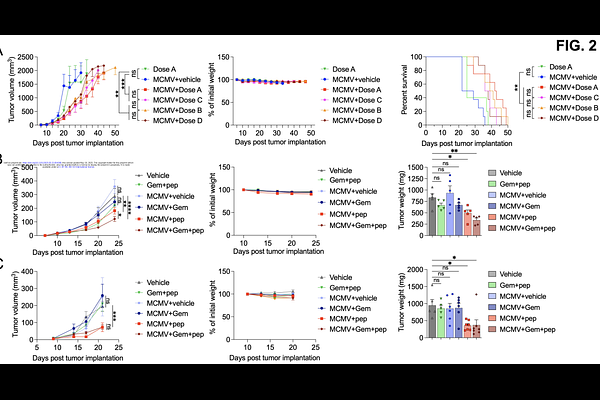Redirecting cytomegalovirus immunity against pancreas cancer for immunotherapy

Redirecting cytomegalovirus immunity against pancreas cancer for immunotherapy
Marrocco, R.; Patel, J.; Medari, R.; Salu, P.; Lucero-Meza, E.; Brunel, S.; Martsinkovskiy, A.; Sun, S.; Gulay, K.; Jaljuli, M.; Mose, E.; Lowy, A.; Benedict, C. A.; Hurtado de Mendoza, T.
AbstractImmunotherapy shows limited success in pancreatic cancer, largely due to a low mutational burden and immunosuppressive microenvironment. Here we hypothesized that pre-existing antiviral immunity can be redirected to control pancreatic tumors. Cytomegalovirus (CMV, a beta-herpesvirus) was chosen, as the majority of the population is infected and it induces an extremely large/broad memory T cell response. Mice latently infected with murine CMV (MCMV) were orthotopically implanted with pancreatic cancer cells and treated with systemic injections of MCMV T-cell epitopes. The therapy promoted preferential accumulation of MCMV-specific T cells within pancreatic tumors, delaying tumor growth and increasing survival. Immunophenotyping and scRNAseq analyses showed these T cells were highly activated and cytotoxic, leading to increased tumor necrosis and caspase-3 activation. Finally, therapy was enhanced when combined with subtherapeutic doses of gemcitabine chemotherapy. Together, these results show that CMV-specific T cells can be repurposed to combat pancreatic cancer. Our studies reveal that CMV-specific viral memory T cells can be re-directed to control a solid tumor normally refractory to immunotherapy via a simple, intravenous injection of T cell peptide epitopes. This mutation agnostic approach has significant potential for the development of off-the-shelf therapeutics by stimulating pre-existing antiviral memory and it is widely applicable due to the high prevalence of CMV.